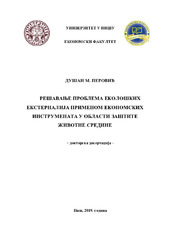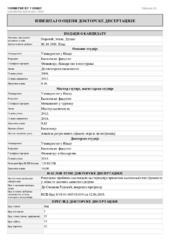Prikaz osnovnih podataka o disertaciji
Rešavanje problema ekoloških eksternalija primenom ekonomskih instrumenata u oblasti zaštite životne sredine
| dc.contributor.advisor | Radukić, Snežana | |
| dc.contributor.other | Stojanović, Boban | |
| dc.contributor.other | Petrović, Jelena | |
| dc.creator | Perović, Dušan M. | |
| dc.date.accessioned | 2020-02-24T11:51:22Z | |
| dc.date.available | 2020-02-24T11:51:22Z | |
| dc.date.available | 2020-07-03T16:00:00Z | |
| dc.date.issued | 2019-09-19 | |
| dc.identifier.uri | https://nardus.mpn.gov.rs/handle/123456789/11965 | |
| dc.identifier.uri | http://eteze.ni.ac.rs/application/showtheses?thesesId=7214 | |
| dc.identifier.uri | https://fedorani.ni.ac.rs/fedora/get/o:1615/bdef:Content/download | |
| dc.identifier.uri | http://vbs.rs/scripts/cobiss?command=DISPLAY&base=70052&RID=534168214 | |
| dc.description.abstract | Sustainable development concept has become one of dominant social doctrines in the world and so large number of countries has started to pay more attention to environmental protection. Therefore, legislature changed, new strategies were adopted, and new instruments were introduced in order to reduce harmful impact of individuals and companies on the environment. By incorporating basic environmental principles in their business flows, companies were obligated to accept the existence of indirect and direct costs from their impact on the environment and calculate them into full price of products and goods. This way, many stakeholders can get full information about the impact of certain companies on the environment. The core idea of research was to empirically evaluate the relationship between the environmental externalities and economic instruments for environmental protection.in EU and Western Balkans. Beside analysis at national level, research involves analysis at micro level. Results showed the strong impact of economic instruments on economic indicators in EU–28 and EU–15, while they have weak impact in EU–Balkans and Western Balkans. Among the economic instruments economic taxes, duties, fees, investments and global financial aid have strong impact on indicators such as total primary energy supply, total natural resources rents and total generated waste. At micro level, results showed that environmental investments from companies have strong impact on their liquidity. Dissertation will help in better understanding of economic mechanisms for environmental protection in EU and Western Balkans. Research is particularly important for Western Balkans where environmental externalities were not in the focus of these countries and this is why some positive effects from environmental policy in Western Balkans were absent. | en |
| dc.format | application/pdf | |
| dc.language | sr | |
| dc.publisher | Универзитет у Нишу, Економски факултет | sr |
| dc.rights | openAccess | en |
| dc.rights.uri | https://creativecommons.org/licenses/by-nc-nd/4.0/ | |
| dc.source | Универзитет у Нишу | sr |
| dc.subject | Ekološke eksternalije | sr |
| dc.subject | Environmental externalities | en |
| dc.subject | ekonomski instrumenti | sr |
| dc.subject | životna sredina | sr |
| dc.subject | EU | sr |
| dc.subject | Zapadni Balkan | sr |
| dc.subject | ekonometrijska analiza | sr |
| dc.subject | economic instruments | en |
| dc.subject | environment | en |
| dc.subject | EU | en |
| dc.subject | Western Balkans | en |
| dc.subject | econometrics | en |
| dc.title | Rešavanje problema ekoloških eksternalija primenom ekonomskih instrumenata u oblasti zaštite životne sredine | sr |
| dc.type | doctoralThesis | en |
| dc.rights.license | BY-NC-ND | |
| dc.identifier.fulltext | https://nardus.mpn.gov.rs/bitstream/id/51743/Disertacija.pdf | |
| dc.identifier.fulltext | http://nardus.mpn.gov.rs/bitstream/id/51743/Disertacija.pdf | |
| dc.identifier.fulltext | http://nardus.mpn.gov.rs/bitstream/id/51744/Perovic_Dusan.pdf | |
| dc.identifier.fulltext | https://nardus.mpn.gov.rs/bitstream/id/51744/Perovic_Dusan.pdf | |
| dc.identifier.rcub | https://hdl.handle.net/21.15107/rcub_nardus_11965 |



